| Listing 1 - 10 of 16 | << page >> |
Sort by
|
Book
ISBN: 9789633864890 Year: 1999 Publisher: Budapest New York
Abstract | Keywords | Export | Availability | Bookmark
 Loading...
Loading...Choose an application
- Reference Manager
- EndNote
- RefWorks (Direct export to RefWorks)
Successful transition for any post-communist country is reliant upon market, government and the civil sector. Potucek's pioneering study of the Czech Republic highlights the early transitional mistakes made during the Klaus era with respect to the role of these sectors. Not Only the Market examines the balance between where the sectors are or should be and makes useful comparisons with other post-communist countries. Focusing on developmental issues, the book looks at a number of public concerns including social and health care reform, privatization and the emerging patterns of corporatism and examines problems such as insufficient legislation, excessive lenience and the incompetence of public administration which has created an unreasonably large space for socio-pathological forces - corruption, Mafia activity and the siphoning of public funds into private hands. The causes and consequences of these forces are considered and Potucek provides a blueprint of reform which emphasizes the necessity of a conscious public policy to optimize both freedom and inequality.
BUSINESS & ECONOMICS / Government & Business. --- Corruption. --- Health policy. --- Transition economies. --- Values. --- postcommunism. --- social policy.
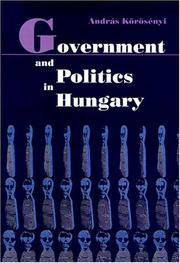
ISBN: 9786155211379 9786155211379 9786155211379 615521137X 0585439672 1281376604 9786611376604 9780585439679 9639116769 9789639116764 9639116610 9789639116610 Year: 1999 Publisher: Budapest, Hungary New York [Budapest] CEU Press Osiris
Abstract | Keywords | Export | Availability | Bookmark
 Loading...
Loading...Choose an application
- Reference Manager
- EndNote
- RefWorks (Direct export to RefWorks)
Based on unprecedented access to information, Government and Politics in Hungary provides not only a historical overview but also an analysis of the main political actors, constitution, electoral system, parliament and political parties of Hungary.This timely and detailed analysis contains a wealth of important data which serves two major objectives. The first is to survey the most important institutions of the political and governmental systems and the cultural and behavioural characteristics of Hungarian politics. The second, is to provide the reader with a clear understanding of the two-way relationship between cultural-behavioural and constitutional-institutional levels of politics in Hungary. The book challenges many stereotypes of post-communist political literature and reveals why Hungarian politics does not fit into many of the generalizations and 'pigeon holes' of contemporary political science.

ISBN: 0880991968 0585282978 9780585282978 9780880991964 9780880991957 088099195X Year: 1999 Publisher: Kalamazoo, MI W.E. Upjohn Institute for Employment Research
Abstract | Keywords | Export | Availability | Bookmark
 Loading...
Loading...Choose an application
- Reference Manager
- EndNote
- RefWorks (Direct export to RefWorks)
BUSINESS & ECONOMICS --- Economic Conditions --- Capitalism --- Post-communism --- Mixed economy --- Economic History --- Business & Economics --- Economic aspects --- China --- Economic conditions --- Economic policy --- Politics and government --- Economy, Mixed --- Third way (Economics) --- Postcommunism --- Market economy --- Socialism --- World politics --- Communism --- Economics --- Profit --- Capital
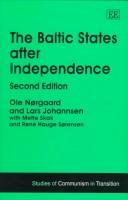
ISBN: 1858988373 Year: 1999 Publisher: Cheltenham Elgar
Abstract | Keywords | Export | Availability | Bookmark
 Loading...
Loading...Choose an application
- Reference Manager
- EndNote
- RefWorks (Direct export to RefWorks)
Economic policy and planning (general) --- Political systems --- Internal politics --- Baltic Area --- Democracy --- Post-communism --- -Democracy --- -947.9 --- Self-government --- Political science --- Equality --- Representative government and representation --- Republics --- Postcommunism --- World politics --- Communism --- Baltic States --- -Baltic States --- -Baltic Republics --- Baltics (States) --- Economic conditions --- Ethnic relations --- History --- -Politics and government --- -Social conditions --- -Economic conditions
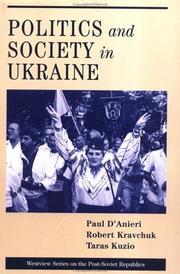
ISBN: 0813335388 Year: 1999 Publisher: Cambridge (Mass.) Westview
Abstract | Keywords | Export | Availability | Bookmark
 Loading...
Loading...Choose an application
- Reference Manager
- EndNote
- RefWorks (Direct export to RefWorks)
Post-communism --- -Political culture --- -Social change --- -#SBIB:328H263 --- Change, Social --- Cultural change --- Cultural transformation --- Societal change --- Socio-cultural change --- Social history --- Social evolution --- Culture --- Political science --- Postcommunism --- World politics --- Communism --- Instellingen en beleid: andere GOS-staten --- Ukraine --- Politics and government --- -Social conditions --- Social change --- Political culture --- #SBIB:328H263 --- Social conditions
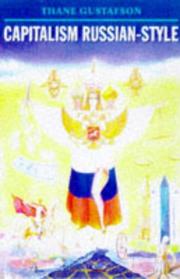
ISBN: 0521645956 0511016697 0521641756 1280420413 0511171900 0511149476 0511309686 051149212X 051105162X 1107116244 9780511016691 9780521641753 9780511492129 6610420416 9786610420414 9780521645959 9781107116245 9780511309687 9780511149474 9780511171901 9781280420412 9780511051623 Year: 1999 Publisher: Cambridge, England : Cambridge University Press,
Abstract | Keywords | Export | Availability | Bookmark
 Loading...
Loading...Choose an application
- Reference Manager
- EndNote
- RefWorks (Direct export to RefWorks)
For a decade Russia has been dismantling communism and building capitalism. Describing a deeply flawed fledgling market economy, Capitalism Russian-Style provides a progress report on one of the most important economic experiments going on in the world today. It describes Russian achievements in building private banks and companies, stock exchanges, new laws and law courts. It analyzes the role of the mafia, the rise of new financial empires, entrepreneurs and business tycoons, and the shrinking Russian state. Thane Gustafson tells how the Soviet system was dismantled and the new market society was born. He argues that this new society is changing constantly, so that any assessment of success and failure would be premature. Identifying investment as vital to preserving Russia's status as a major industrial power, in his final chapter he examines the prospects for an economic miracle in Russia in the twenty-first century.
Capitalism --- -Post-communism --- -#SBIB:328H262 --- #SBIB:35H435 --- Postcommunism --- World politics --- Communism --- Market economy --- Economics --- Profit --- Capital --- Instellingen en beleid: Rusland en het GOS --- Beleidssectoren: economisch en werkgelegenheidsbeleid --- Russia (Federation) --- -Russia (Federation) --- -Economic conditions --- -Social conditions --- -Capitalism. --- Post-communism. --- Economic History --- Economic order --- Economic conditions. Economic development --- Russia --- Capitalism. --- Post-communism --- Economic conditions --- Social conditions --- Social Sciences --- Political Science --- #SBIB:328H262 --- Capitalism - Russia (Federation) --- Post-communism - Russia (Federation)
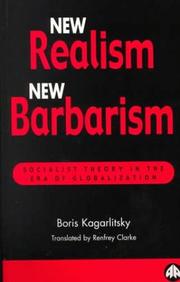
ISBN: 0745315518 0745315569 1849640610 0585425604 9781849640619 9780745315560 9780745315515 9780585425603 Year: 1999 Volume: *1 Publisher: London ; Sterling, Va. : Pluto Press,
Abstract | Keywords | Export | Availability | Bookmark
 Loading...
Loading...Choose an application
- Reference Manager
- EndNote
- RefWorks (Direct export to RefWorks)
Political philosophy. Social philosophy --- Bolchevisme --- Bolshevism --- Capitalism --- Capitalisme --- Capitalisme monopoliste d'État --- Communism --- Communisme --- Communisme international --- Communist movements --- Kapitalisme --- Leninism --- Léninisme --- Maoism --- Maoïsme --- Maoïstes --- Marché [Économie de ] --- Market economy --- Markteconomie --- Marxism --- Marxisme --- Mouvements maoïstes --- Post-communism --- Post-communisme --- Postcommunisme --- Péril rouge (Mythe) --- Régime capitaliste --- Social democracy --- Socialism --- Socialisme --- Socialist movements --- Système capitaliste --- Théorie marxiste --- Économie capitaliste --- Économie de marché --- Économie libérale --- #A0004A --- 388.4 Communisme --- Socialism, Communism & Anarchism --- Political Science --- Law, Politics & Government --- Capitalism. --- Communism. --- Post-communism. --- Socialism. --- Postcommunism --- Trotskyism --- Economics --- Profit --- Capital --- World politics --- Collectivism --- Anarchism --- Critical theory --- Totalitarianism --- Village communities
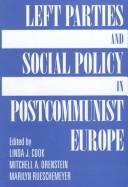
ISBN: 0813335698 Year: 1999 Publisher: Boulder Westview
Abstract | Keywords | Export | Availability | Bookmark
 Loading...
Loading...Choose an application
- Reference Manager
- EndNote
- RefWorks (Direct export to RefWorks)
Socialism --- -Socialism --- -Post-communism --- -Political parties --- -#SBIB:004.AANKOOP --- #SBIB:328H27 --- #SBIB:328H262 --- #SBIB:316.8H40 --- #SBIB:35H437 --- Parties, Political --- Party systems, Political --- Political party systems --- Political science --- Divided government --- Intra-party disagreements (Political parties) --- Political conventions --- Postcommunism --- World politics --- Communism --- Marxism --- Social democracy --- Socialist movements --- Collectivism --- Anarchism --- Critical theory --- Instellingen en beleid: Midden- en Centraal Europa: algemeen --- Instellingen en beleid: Rusland en het GOS --- Sociaal beleid: social policy, sociale zekerheid, verzorgingsstaat --- Beleidssectoren: sociale zekerheid --- Europe, Eastern --- Russia (Federation) --- -Europe, Eastern --- -East Europe --- Eastern Europe --- Social policy. --- Social policy --- Politics and government --- -Politics and government --- Political parties --- Post-communism --- -Social policy. --- #SBIB:004.AANKOOP
Book
ISBN: 1463983492 1463959885 1283535165 9786613847614 1463963165 9781463963163 Year: 1999 Publisher: Washington, D.C. : International Monetary Fund,
Abstract | Keywords | Export | Availability | Bookmark
 Loading...
Loading...Choose an application
- Reference Manager
- EndNote
- RefWorks (Direct export to RefWorks)
For the latest thinking about the international financial system, monetary policy, economic development, poverty reduction, and other critical issues, subscribe to Finance & Development (F&D). This lively quarterly magazine brings you in-depth analyses of these and other subjects by the IMF’s own staff as well as by prominent international experts. Articles are written for lay readers who want to enrich their understanding of the workings of the global economy and the policies and activities of the IMF.
Post-communism --- Postcommunism --- World politics --- Communism --- Economic aspects --- Europe, Eastern --- Former Soviet republics --- Economic conditions --- Economic conditions. --- E-books --- Banks and Banking --- Exports and Imports --- Inflation --- Macroeconomics --- Emigration and Immigration --- Finance: General --- Price Level --- Deflation --- Banks --- Depository Institutions --- Micro Finance Institutions --- Mortgages --- Comparison of Public and Private Enterprises and Nonprofit Institutions --- Privatization --- Contracting Out --- Financial Crises --- International Migration --- Foreign Exchange --- Economic & financial crises & disasters --- Finance --- Banking --- Migration, immigration & emigration --- Migration --- Disinflation --- Prices --- Economic sectors --- Population and demographics --- Commercial banks --- Financial institutions --- Banking crises --- Financial crises --- Banks and banking --- Emigration and immigration --- United States
Book
ISBN: 0881652571 9780881652574 Year: 1999 Volume: 85 Publisher: Princeton (N.J.): Princeton university. Department of economics. International finance section,
Abstract | Keywords | Export | Availability | Bookmark
 Loading...
Loading...Choose an application
- Reference Manager
- EndNote
- RefWorks (Direct export to RefWorks)
Zonder onderwerpscode --- Post-communism --- Economic aspects --- Former Soviet republics --- Europe, Eastern --- Economic policy --- Economic conditions --- -330.52 --- 331.30 --- 338.313 --- CIS / Commonwealth Of Independant States - Gos - Cei --- EEU / Central & Eastern Europe --- -338.947 --- Postcommunism --- World politics --- Communism --- Liberaal systeem. Neo-liberalisme. Theorie van de onderhandeling. --- Economische toestand. --- Kapitalisme. --- -Former Soviet republics --- -CIS countries --- Commonwealth of Independent States countries --- Ex-Soviet republics --- Ex-Soviet states --- Former Soviet states --- New Independent States (Former Soviet republics) --- Newly Independent States (Former Soviet republics) --- NIS (Former Soviet republics) --- East Europe --- Eastern Europe --- -Economic policy --- -Economic conditions --- 338.947 --- 330.52 --- Liberaal systeem. Neo-liberalisme. Theorie van de onderhandeling --- Economische toestand --- Kapitalisme --- Economic conditions. --- Economic policy. --- Post-communism - Economic aspects --- Former Soviet republics - Economic policy --- Europe, Eastern - Economic conditions - 1989 --- -Europe, Eastern - Economic policy - 1989 --- -Former Soviet republics - Economic conditions
| Listing 1 - 10 of 16 | << page >> |
Sort by
|

 Search
Search Feedback
Feedback About UniCat
About UniCat  Help
Help News
News